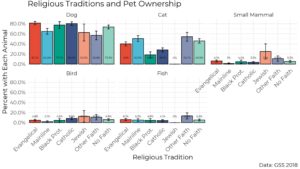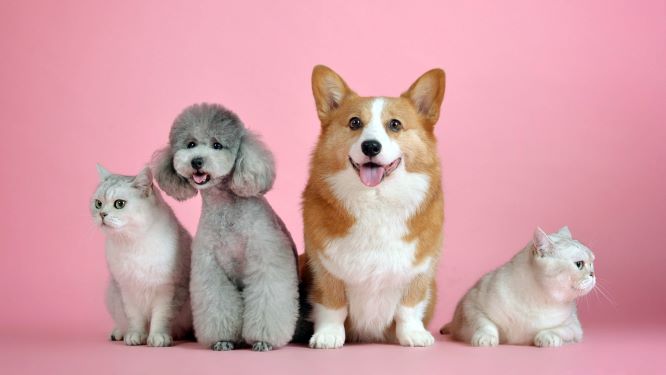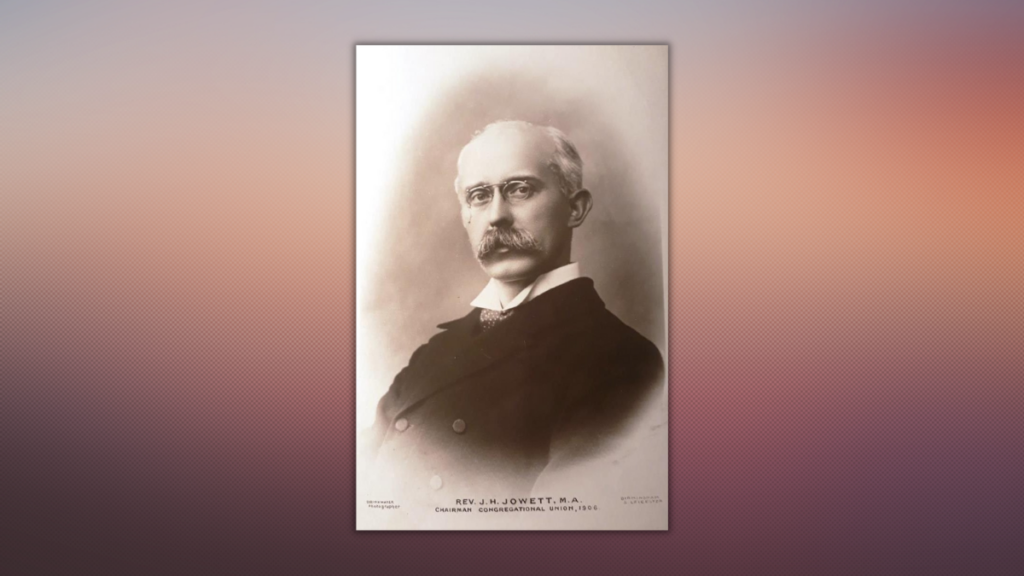By Ryan Burge
Religion News Service
I do not, and will not ever, own a cat.
Instead, I own a dog. In fact, as I type this, Lucy, my 7-pound Yorkshire terrier, is snoring next to me on my office chair.
Why do I prefer dogs to cats?
It could be because — along with being a social scientist — I am an American Baptist pastor. And like many other Christians in the United States, I’m more likely to own a dog than a cat.
My friends who skip church, however, prefer cats.
At least that’s what the data indicates.
In a new article published in the Journal for the Scientific Study of Religion, Samuel Perry and I took advantage of several new questions added to the General Social Survey about pet ownership to look at the relationship between religion and man’s best friends.
First, some general results from the data.
Among Americans who said they own a pet, nearly three-quarters (74.9%) said they had a dog in 2018. Fewer than half (40.3 %) identified as cat owners. The average American pet-owning household has 1.72 animals (which also included reptiles, fish, pigs, goats, birds, horses and small mammals).
Evangelicals, mainline Protestants, the religiously unaffiliated and members of what the GSS calls “other faiths” — religious people who are not Christian or Jewish — have the most pets, at nearly two per family.
Catholic households, on average, have one and a half pets, while Jews (.95 pets) and black Protestants (.72 pets) average just under one pet each.
What about type of animal owned by religious tradition?
Dogs are the most popular household pet. In fact, there’s no religious tradition in which fewer than half of adherents own a dog.
However, there are some interesting differences among faith groups. Evangelicals and Catholics are more likely to have dogs than are mainline Christians. Mainliners are more likely than evangelicals and black Protestants to own cats. Jews prefer dogs to cats. Jewish families are also more likely than other traditions to own a small mammal or a bird.
Those who claim no religious identity are most likely to have a cat.

We also found one other interesting piece of data.
For our study, we put together a regression model that predicted how many pets were owned at each level of church attendance while controlling for a number of factors that could impact pet ownership, such as income, geography, gender, race and education.
While not conclusive, it appears that the more someone goes to church or other religious worship service, the less likely they are to own a pet.
Why is this the case?
We suggest two possible reasons.
One is practical. People who are highly involved in activities at church or other houses of worship may not have the time to take care of a lot of animals in their home.
A second possibility is that people may be using pets as a replacement for social interaction. Therefore, people who are frequently attending church events don’t need to fill that social void with pets.
In another regression model, we found that higher church attendance is especially predictive of lower cat ownership.
A wealth of social science has found that cat owners are more likely to express feelings of being socially isolated. It seems possible that the same factors that drive people to be religiously unaffiliated may also make them more likely to own a cat. Or, said more succinctly: Controlling for other factors, cats are the preferred pet among those who never go to church.
While this is not the most groundbreaking research published in recent memory, we do think that it speaks to something more significant happening in American culture.
As Robert Putnam famously concluded in his 2000 book, ” Bowling Alone,” we are more socially atomized now than ever before. While fraternal organizations, bowling leagues and church used to fill that social void decades ago, Americans have now turned to other methods of not feeling alone.
While social media sites have provided some facade of social interaction, many of us have discovered that pets fill that void nicely.
It’s hard not to smile when you come home from work and your dog — or your cat — is happy to see you, no matter what you believe.
EDITOR’S NOTE — Ryan Burge is an assistant professor of political science at Eastern Illinois University and can be reached at @ryanburge. The views expressed in this commentary do not necessarily reflect those of Religion News Service or The Alabama Baptist.






Share with others: